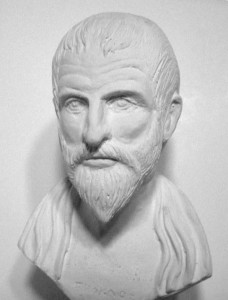Proclus *
Proclus Lycaeus (412-487) is considered the last major Greek philosopher.  He came from a rich family in Constantinople. After studying in Alexandria and a brief legal career in Constantinople, he went to Athens to study at the famous School of Philosophy founded 800 years earlier by Plato.
He came from a rich family in Constantinople. After studying in Alexandria and a brief legal career in Constantinople, he went to Athens to study at the famous School of Philosophy founded 800 years earlier by Plato.
He refers to ancient historians mentioning seven small islands in the Outer Ocean (Atlantic) dedicated to Persephone and three larger ones, of which one was 1,000 stadia long and dedicated to Poseidon.
It was Proclus who recorded(d) that Crantor travelled to Sais, as part of his research for Plato’s biography and like Solon was shown the pillars on which the Atlantis story was recorded.
In 1820, Thomas Taylor produced the only English translation that we have of Proclus’ commentary. Andrew Collins has drawn attention[0072.100] to a translation error by Taylor, noted by Alan Cameron(e) and Peter James, which seems to offer a quote from Plato rather than Crantor, which in turn obscures whether it was Crantor or Plato actually travelled to Egypt.
A website(a) dealing with the works of Gerald Massey includes Thomas Taylor’s translation of Proclus’ commentary on Plato’s Timaeus(b).
Taylor notes that in a fragment from a lost book of Proclus, he seems to refer to orichalcum under the name of migma(c).
(a) https://web.archive.org/web/20170618062721/https://www.masseiana.org/intro.htm
(b) https://archive.org/details/proclusontimaeus01procuoft (vol..1) *
https://archive.org/details/proclusontimaeus02procuoft (Vol..2) *
(c) https://www.sacred-texts.com/cla/flwp/flwp26.htm
(d) In Platonis Theologiam
(e) https://www.academia.edu/25684803/Crantor_and_Posidonius_on_Atlantis?email_work_card=title
